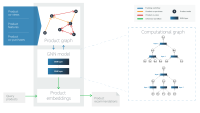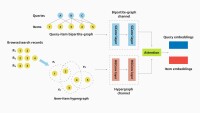Amazon's massive catalogue makes it possible to personalize a customer's shopping experience in countless ways. It's not surprising when the Amazon Store anticipates you've come back to buy the treats your dog loves, and you see the option up front on the homepage.
But there may also be similar brands worth considering for your pup. Also, you might be due for more face wash, an item in your wishlist is on sale, and several options match the jeans you were looking for the other day.
Ren Zhang's team uses science to present customers with the most relevant offerings possible. As director of research science for personalization strategic initiatives including Buy Again, Amazon Fresh, Amazon Business, Pets, and Beauty, Zhang applies deep learning for tailored, real-time recommendations to customers.
"Our goal is to understand the customer's intention for that moment and provide relevant experiences and products," she says. "The complexity we're solving, and the impact we have, make our team a haven for scientists."
Anticipating the customer's needs
As every shopper knows, what you intend to do when you get to a store and what you actually do are often two different things. Did you buy dog treats because you set out to do that or because seeing them reminded you to?
Understanding customers’ preferences can be challenging in a noisy environment where customers may have a number of potential factors motivating a decision. For example, if a product's placement influences a decision, that's a case of bias caused by position. Some items are more likely to be selected by customers simply because they are placed at more visible locations. This is just one of many challenges Zhang's team is trying to solve.
"There are all kinds of interesting science problems in a very noisy environment," Zhang says. "How do you design an experiment with so much going on and truly learn the right thing?"
Zhang and her team have published research on how to refine recommendations in a field of likely choices — e.g., should Toy Story be recommended because it’s relevant to you or just because it’s a wildly popular movie? In the paper, “Don’t recommend the obvious: Estimate probability ratios,” they demonstrate how popularity-sampled metrics are a better fit for personalized recommendations because they directly measure a system’s ability to identify items special to a user over generally probable items.
Another challenge is to bring transparency to the recommender. While deep-learning algorithms outperform traditional methods, they don’t, by default, provide any rationale for the conclusions they reach.
"Typically, customers are more likely to engage with a recommendation if they know why they're getting one. But we're talking about millions of records to come up with a response. How do you decipher that for customers?" she says. "The complexity of the methodology, the massive data, and the expected response time latency makes the problem extremely challenging."
Zhang and her team collaborate with Amazon Scholars like Iain Murray on solutions to such problems. A professor of machine learning and inference at the University of Edinburgh, Murray contributes to the team's research and brings ideas of his own.
"There are a lot of brainstorming sessions," Zhang says of the relationship with Murray. "It's not only helping us advance, but it's a great talent magnet as well. Scientists are attracted to a community that fosters innovation and research in science."
Zhang ensures that 20 to 30% of her team's time goes to exploratory research that they believe is the future — work that in the near term may not have a direct business impact.
"I have a much higher tolerance for failure when it comes to this kind of research," she says. "Scientists need that kind of freedom to explore, to feel excited. That kind of energy is what you need to have a high-performing team and have the right culture."
Focused on business impact
Zhang joined Amazon in July 2021 after a series of leading data science roles in the finance world at companies including Prudential and American Express. A love of math led her to study probability and statistics at Peking University in China, where she earned her bachelor's degree, and to eventually earn her doctorate in statistics from the University of Pennsylvania's Wharton School.
I love to drive business impact, and I could see Amazon as an innovation powerhouse that was going to be a fabulous place for me to do that. I've seen extremely talented people in my career, but the average bar at Amazon is so high.
Her advisor at Wharton, the late Lawrence Brown, was a scholar through and through, and her studies were geared toward academia. But after some corporate internships and conversations with former department mates, Zhang realized she wanted to be out solving practical problems.
"It took me quite some courage to go to him and say, 'Hi, Larry, I don't think I want to be a professor, I need to go into industry,’" she recalls.
Her first job was at American Express, where she says she "grew up, career-wise." Over nearly 13 years there, she took on roles in a variety of divisions, from business loans to membership rewards to risk and information management. When she was the chief data scientist for BMO Financial, an Amazon recruiter reached out. She recognized the opportunity to move to the tech sector, which had long fascinated her.
"I love to drive business impact, and I could see Amazon as an innovation powerhouse that was going to be a fabulous place for me to do that," she says, adding that she has been impressed with Amazon's talent. "I've seen extremely talented people in my career, but the average bar at Amazon is so high."
Zhang joined as director of data science for worldwide selling partner development, helping Amazon sellers extract insights such as how customers were finding their products and ways to build customer loyalty. She switched to her current role in personalization in spring 2022, fascinated by the ability to experiment and ultimately see direct benefits for customers.
Any scientist who wants to work in the industry has to have a practical mindset, according to Zhang. "You need to be able to use data science to solve a business problem," she says. "The toughest talent to find, typically, is a talent who can bridge fields."
Zhang herself works hard to make sure she knows the business and engineering side of any scientific topic at Amazon. She points to Ash Gupta, with whom she worked early in her career when he was chief risk officer at American Express, as a role model. Even as a senior executive, Gupta would often delve into details and challenge his staff on various areas like systems, processes, and policies. He had a deep knowledge of the risk management space while driving the vision at the same time.
It's a level of discipline Zhang considers important for anyone who wants to foster good science but also deliver results.
"No matter what level of leader you are," she says, "you should never be disconnected from what's going on in the field beyond your own area. Science will not be able to deliver impact without an appealing customer experience design and robust engineering system."






















